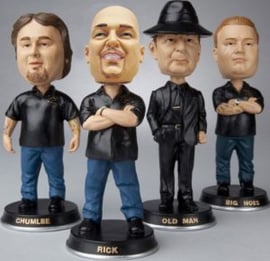After yesterday's post on low-priced, part-time competitors wrapped, I was searching Sunday for a reality TV program marathon to supply potential blog content on strategy or creativity. I watched several hours of a "Pawn Stars" marathon on the History Channel and got a big dose of pricing negotiating strategy lessons. Thanks to frequent promos, I learned this reality TV show about a Las Vegas pawn shop run by Rick Harrison and his family is the number one show on cable TV. Who knew?
 "Pawn Stars" focuses only on a relatively narrow slice of activity - the part that fits with History Channel themes. There are hardly any pawns (all but one transaction involved people selling merchandise), and every transaction revolves around an item of real or alleged historical or cultural interest. Imagine the PBS series "Antique's Roadshow" with dickering and cash actually changing hands.
"Pawn Stars" focuses only on a relatively narrow slice of activity - the part that fits with History Channel themes. There are hardly any pawns (all but one transaction involved people selling merchandise), and every transaction revolves around an item of real or alleged historical or cultural interest. Imagine the PBS series "Antique's Roadshow" with dickering and cash actually changing hands.
There were a variety of negotiating strategy lessons applicable to yesterday's post (a freelancer negotiating for market prices against a low-priced competitor) and to readers using negotiations to establish price points for their work (us included). Here are five negotiations lessons which stood out:
1. Having trusted experts at your disposal makes you a stronger negotiator.
With so many merchandise categories (i.e., jukeboxes, historical films, Revolutionary War bonds, 500-year old armaments, nearly-new semi-tractors), Rick consults multiple experts for insight, corroboration, and pricing opinions. He's open about these experts, and typically has them share their perspectives directly in front of the seller. Beyond appraisal experts, Rick's restoration specialist (Rick Dale, who also has a History Channel show) can apparently rehab any item. Having a "turnaround person" on the team allows for more timely and aggressive negotiations.
Negotiating Strategy Question: Are you trying to go it alone in pricing negotiations without the right experts around you to help you be more effective?
2. Before negotiating, know what matters for your organization and critical decision making rules of thumb. Don't veer from them.
Rick and his father, "The Old Man," are adamant about making money on everything they buy. Since the pawn shop functions as a wholesaler when buying merchandise, the Harrisons target a 25-30% margin on each item for overhead and profit. Clearly knowing what matters and their profit objectives, much of the pricing negotiation becomes relatively simple mathematics. The rest is keeping emotions in check and improving the odds of success by being a conservative negotiator. That means being willing to say no to merchandise (or clients, sales, projects) you may really want that don't make sense.
Negotiating Strategy Question: Do you know what matters for your organization, and how often do you walk away from deals where the fundamentals aren't good for you?
3. When someone says, "Lots of people think this about that," call B.S. on them. Immediately.
Many a person comes into Rick's pawn shop saying other people told them their items are worth lots of money. Rick's response is, "Did any of those people offer to buy it for that much?" The answer is always no. When people are throwing generic, non-attributed opinions into a negotiation (be they about cost, ease of completion, ability of others besides you to perform the work. etc.), ask them straight up, "Are any of the people acting on what they think?"
Negotiating Strategy Question: How often do you stand up to a potential client and call B.S. - even if in a nice way?
4. Start by asking question to make the other party go first.
Once the initial information gathering discussion appears done, Rick and his family seem to use a standard kickoff to negotiations. They ask what the person wants to do (pawn or sell), and what the individual wants to get for the merchandise. Asking the first question puts Rick Harrison in control of pricing negotiations and sustains the information gathering. Finding out whether the seller has a price in mind (and how it was arrived at) reveals further insights on their research and knowledge level.
Negotiating Strategy Question: Do you have a first negotiating question, and are you asking it so the other person talks first?
5. Use a wide variety of reactions during negotiations.
If there are patterns in how Rick Harrison responds during price negotiations, they're tough to discern (even after getting the perspectives he shares in off-the-floor interview snippets). During negotiations, Rick flattered, stalled, offered excuses (for why he couldn't pay more), laughed, did nothing, said nothing, stipulated caveats, and counter-offered. Only once did he accept a first offer (paying $80 for a 1960's shortwave radio he thought was very fairly priced) or go first in the negotiation (making an offer for a Revolutionary War bond engraved by Paul Revere, Jr.).
Negotiating Strategy Question: Have you consciously developed a whole variety of reactions you use during negotiations?
Wrap-Up Lessons
Those were my take-aways from the "Pawn Shop" marathon. Have you watched the show? If you have, what negotiating lessons have you learned? Or what negotiating tactics have you seen that work well? – Mike Brown
The Brainzooming Group helps make smart organizations more successful by rapidly expanding their strategic options and creating innovative plans they can efficiently implement. Email us at brainzooming@gmail.com or call us at 816-509-5320 to learn how we can help you enhance your brand strategy and implementation efforts.



